GetStudySolution
Getstudysolution is an online educational platform that allows students to access quality educational services and study materials at no cost.
NCERT Solutions for class 6 Civics chapter 3 – What is Government?
Back Exercise
1. What do you understand by the word 'government'? List five ways in which you think the government affects your daily life.Answer
Government is the mechanism or groups which governs and implements decisions in an organised manner formed under certain written rules.
Five ways in which government affects your daily life:
(i) It protect the boundaries of the country and maintain peaceful relations with other countries.
(ii) It takes action on many social issues.
(iii) It ensures welfare of its citizens and provide health facilities.
(iv) It ensures the supply of food and drinking water to its people.
(v) It helps in running of the postal and railways services.
2. Why do you think the government needs to make rules for everyone in the form of laws?
Answer
Government needs to make rules for everyone in the form of laws because:
(i) It helps in preventing the authority from the misuse of their powers.
(ii) It helps in the functioning of the government.
(iii) It helps the people in leading their normal and peaceful life.
(iv) It ensures the security of the nation and its people.
3. Name two essential features of a democratic government.
Answer
Two essential features of a democratic government:
(i) People have the right to elect their own Government throgh elections.
(ii) Government is accountable to its people.
(iii) Universal Adult Franchise.
4. What was the suffrage movement? What did it accomplish?
Answer
Suffrage means right to vote. Women and the poor have had to fight for participation in government all over Europe and USA. During the first world war, it got strengthened and known as the suffrage movement.
It gave right to vote to the America women in 1920 and women in the UK got to vote on the same terms as men in 1928.
5. Gandhiji strongly believed that every adult in India should be given the right to vote. However, a few people don't share his views. They feel that illiterate people, who are mainly poor, should not be given he right to vote. What do you think? Do you think this would be a form of discrimination? Give five points to support your view and share these with the class.
Answer
Yes, it would be a form of discrimination on the basis of education. Five points to support my view:
(i) These people will not able to participate in the Government and hence feel neglected from the society.
(ii) People from all classes fought for the independence and these rights thus everyone should be treated equally.
(iii) People are not illiterate or poor by their choice.
(iv) Every adult should be given right to vote according to Universal Adult Franchise.
(v) It will conflict the idea of right to equality of Democracy.
In-Text Questions
Question 1.
Question Box:
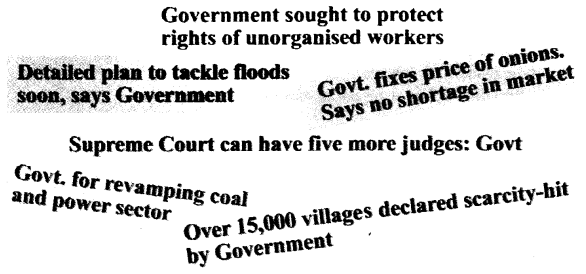
- Look at the newspaper headlines above and list the different kinds of activities that the government is reported to be doing in these newspaper headlines.
- Isn’t this a wide range of activities?
- What do you think government is? Discuss in class.
Answer:
- List of the different kinds of activities that the government is reported to be doing in the newspaper headlines:
- The government protects the rights of the unorganised workers.
- It fixes prices of essential commodities when they are in short supply.
- It tackles floods.
- It revamps coal and power sector.
- It declares villages scarcity hit and provides relief.
- It appoints judges to high courts and Supreme Court.
- Yes, the government has a wide range of activities.
- The Government:
The government is the organisation which makes decisions and
- builds roads and schools.
- reduces the prices of essential commodities, increases the supply of electricity.
- implements several programmes to help the poor.
- runs postal and railway services.
- protects the boundaries of the country.
- maintains peaceful relations with other countries.
- provides people enough food and medical facilities.
- organises aid and assistance for the affected people during disasters like Tsunami and earthquakes, and
- organises courts for the redressal of people’s grievances.
Question 2.
Question Box: (NCERT Page 28)
Can you list three things that the government does which have not been mentioned?
Answer:
- To provide drinking water.
- To give employment to the people.
- To arrange for housing facilities to the poor.
Question 3.
Can you think of how the government manages to do all this?
Answer:
Yes, the government manages to do all this by doing the following:
The government works at different levels- At central, state, district, tehsil and village levels.
Local level : covers village, town or city
District Level : covers the entire district
State level : covers the entire state
National or central Level : covers the entire country
(i) National Level: Indian Union: Capital: New Delhi.
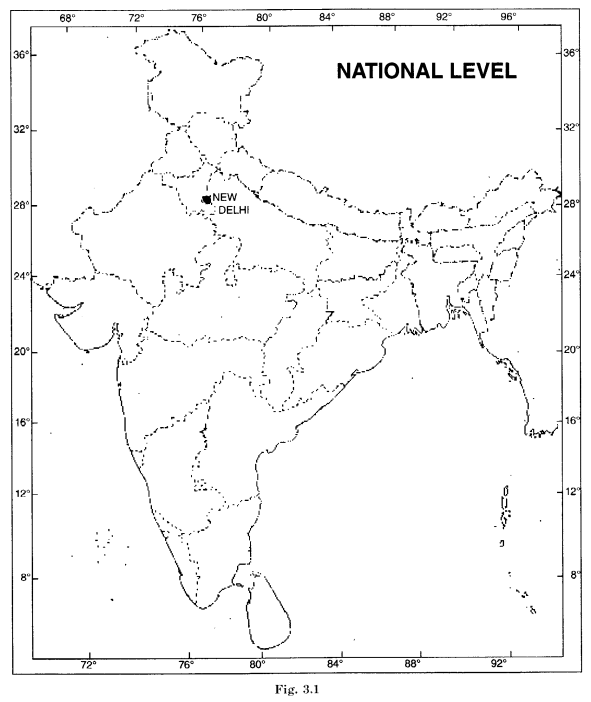
(ii) State Level: 28 States and 7 Union Territories
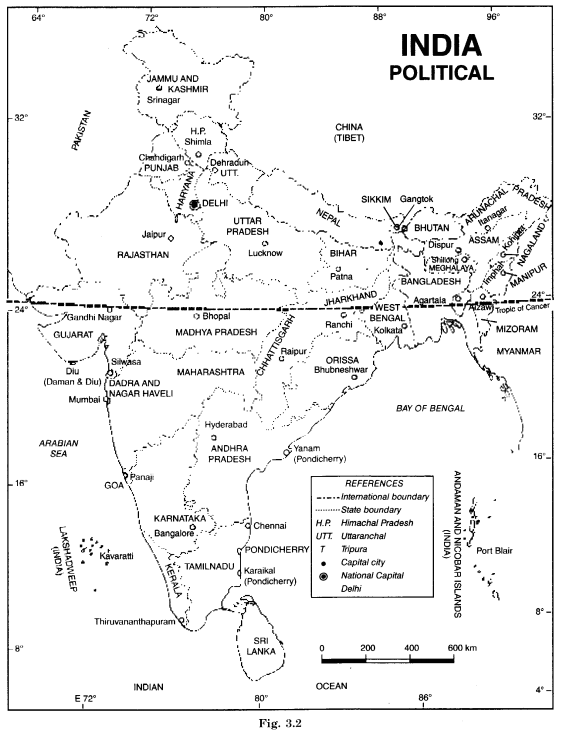
(iii) District Level: 602 districts in India (2005)
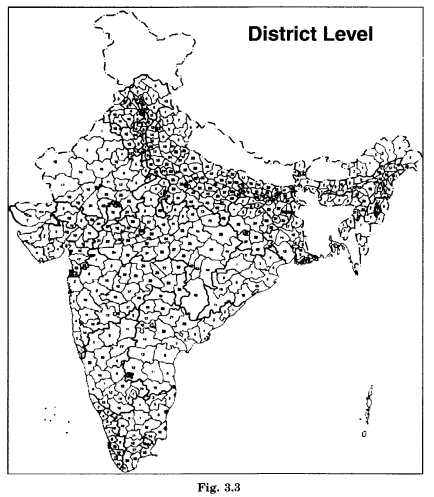
Question 4.
Exercise: (NCERT Page 30)
Look at the statements in the column on the left. Can you identify which level they belong to? Place tick marks against the level you consider most appropriate.
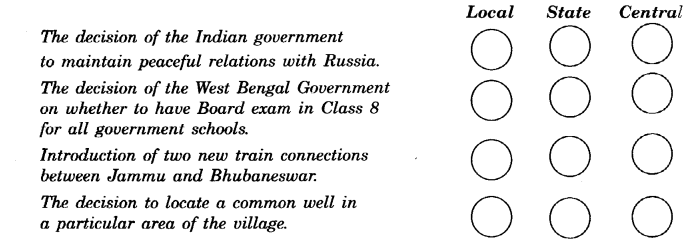

Answer:
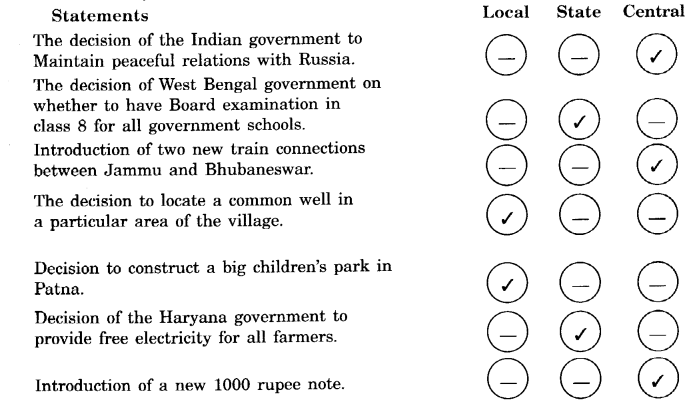
Question 5.
Discuss: (NCERT Page 31)
Think of an example of another law. Why do you think it is important that people abide by this law?
Answer:
- We take an example of freedom to adopt religion.
- If any person is not allowed to enter a temple, he may go to court against the law, because to adopt any religion is the fundamental right of the citizens.
- No one can deny him to do so.
Question 6.
Who gives the government this power to make decisions and enforce laws? (NCERT Page 31)
Answer:
The power to make decisions and make laws lies in the form or type of government.
- In democracy it is the people. The people do this through elections.
- In monarchy the king or the queen has the power to make decisions and enforce laws. The monarch may have a small group to discuss matters but final decision lies with the monarch.
Question 7.
Discuss:
- Do you think it is important for people to be involved in decisions that affect them? Give two reasons for your answer.
- Which type of government would you prefer to have in the place you live in? Why?
- Which of the statements below is correct? Correct those sentences that you think need correction.
(a) In a monarchy the country’s citizens are allowed to elect whomever they want.
(b) In a democracy a king has absolute powers to rule the country.
(c) In a monarchy, people can raise questions about the decisions the monarch takes. (NCERT Page 32)
Answer:
- Yes it is important for people to be involved in decisions that affect them. Reasons for them are:
- The people are affected by price rise, if the prices of essential commodities are raised.
- People are affected if their dwelling units are demolished. Hence they should be informed about the demolitions in advance.
- We would prefer democracy as a form of government because people take decisions and make laws in democracy through their elected representatives.
- Correct statements:
None of the statements are correct.
(a) In a monarchy, the citizens are not allowed to elect whomsoever they went. It is based on hereditary.
(b) In a democracy people have the power.
(c) In a monarchy people cannot raise questions about decisions taken by the monarch.
Question 8.
Can you believe that there was a time when governments did not allow women and the poor to participate in elections?
Answer:
We believe that there was a time when women and the poor were not allowed to participate in elections:
- In the earliest times only land owning or property owning men could participate in the elections.
- Only the educated persons (men only) could participate in voting.
- It means that the women, the poor, the uneducated and the property less people were not allowed to vote.